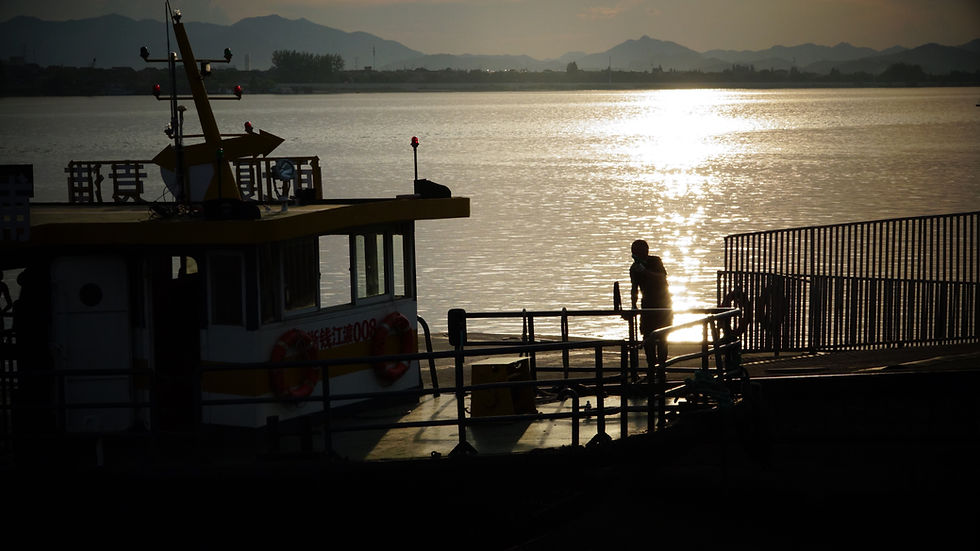Being a Shipwife: A Life Adrift
- a17794542693
- Nov 4, 2025
- 3 min read
Updated: Nov 23, 2025
At seven in the morning, the Qiantang River at Shuangpu Anchorage is shrouded in morning mist. Li Dajie emerges from the cabin of her cargo ship, “Zhe Fuyang Huo 668,” to begin her day. Her vessel sits among a dense cluster of boats—a floating home on the water.
Shuangpu Anchorage is where ships temporarily reside, where ferrymen and shipwives could stock up food and necessities enough to last another week aboard ship. I was lucky enough to get to talk to three shipwives here: Li Dajie, Zhang Xiuzhen, and You Chunxia.

I. Life Afloat: A Dual Reality of Freedom and Confinement
“They say we’re free, but actually, we’re the least free,” Li says as she inspects the mooring ropes. “We don’t have to answer to a boss, but we have to answer to the weather, the water levels, and the ship locks.”
She and her husband have been operating this 44-meter-long cargo ship for over a year. The boat was newly built in 2023 with a bank loan of 2.8 million yuan, requiring monthly repayments of tens of thousands of yuan. “People think we live freely on the river, but the truth is, we’re tied to this ship. Once, we went 23 days straight without setting foot on land.”
At Shuangpu Anchorage, “couple-operated boats” like Li’s are the majority. The husband typically pilots the vessel, while the wife serves as engineer, cook, and cleaner. To save costs, many boat women obtain engineering certifications—Li is one of them.
"In summer, the engine room is like a steamer; in winter, it’s an icebox. But no matter how tough it is, we have to go down for maintenance. If the ship breaks down, we can’t afford the repair costs or the delays,” she explains.
II. Children's Education: A Mother’s Heartache
When the conversation turns to her child, Li’s voice softens. “My son is in university now. When he was little, we were on the boat all year round, so we had to leave him with his grandmother."
This regret is common among boat women. Zhang Xiuzhen, who has been working on boats for 17 years, tears up when speaking of her child: "Every time he did poorly on an exam, I blamed myself. If I’d been with him, at least I could have helped with his homework.”
Her son eventually entered a vocational school. “Now I just hope he can learn a skill after graduation, find a stable job, and never work on a boat.”
You Chunxia’s daughter, however, made it to university, studying computer science. “That’s our greatest comfort,” You say. “I endure this hard life on the boat so she won’t have to.”
III. Operating Challenges: Earning a Living on the Waves
The cargo business is not easy. Li breaks down the costs: fuel, lock fees, docking fees, agency fees, plus monthly loan repayments—leaving little profit after each trip.
“Shipping rates rise slowly, but fuel prices jump fast. Sometimes we have to lower our prices just to secure business,” she says. “Bad weather is what we fear most—delays mean losing money.”
Zhang Xiuzhen adds, “Young people nowadays don’t want to do this kind of work. We veteran boat workers don’t know how to do anything else. It’s hard to switch careers.”

IV. The Future: Dreams of Life Ashore and Harsh Realities
When discussing the future, each of the three women has her own plan.
Li Dajie intends to work for another ten years, until her loan is fully repaid. “Then I’ll buy a small apartment in town, open a little shop, and live a stable life.”
You Chunxia plans to sell her boat and go ashore within a year or two. “We’ll renovate our old house and help our daughter with a down payment for an apartment in Hangzhou. The rest we’ll keep for retirement.”
Zhang Xiuzhen’s aspirations are more modest: “Maybe I’ll work as a supermarket cashier or a cleaner. As long as I can be home, I don’t mind earning less.”
Yet they are all aware that transitioning from water to land won’t be easy. “After so long on the boat, life on shore feels strange,” Li admits wryly. “Sometimes I wake up in the middle of the night and still feel the bed rocking.”
As dusk falls and the interview concludes, lights begin to twinkle across the boats at Shuangpu Anchorage, creating the illusion of a floating city. Li Dajie starts preparing dinner, smoke curling up from her cabin.
“This is our life,” she says, standing at the bow and gazing at the distant river. “It looks free, but every step is a struggle.”
Early tomorrow, her ship will set sail again—carrying cargo, dreams, and worries—continuing its endless drift on the Qiantang River.

![Poem: "The Boatmen Community [A Neo-River Colony]"](https://static.wixstatic.com/media/929abe_e0b364e18dd743ce8092b77179359ff5~mv2.jpg/v1/fill/w_980,h_551,al_c,q_85,usm_0.66_1.00_0.01,enc_avif,quality_auto/929abe_e0b364e18dd743ce8092b77179359ff5~mv2.jpg)

Comments